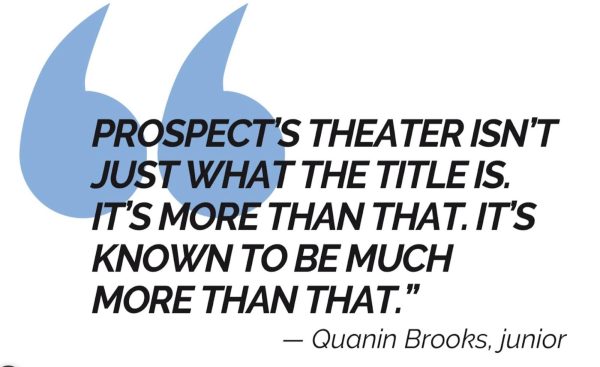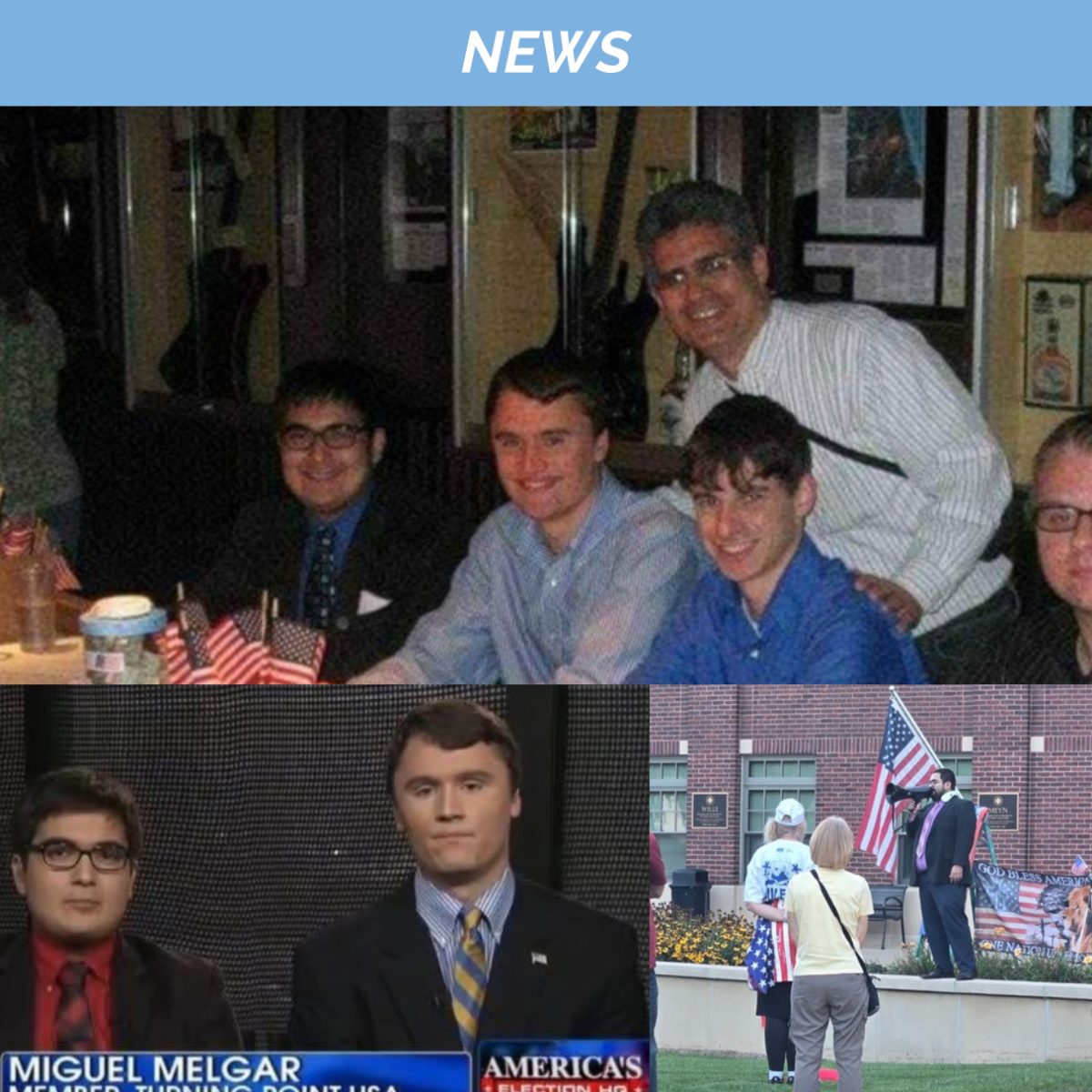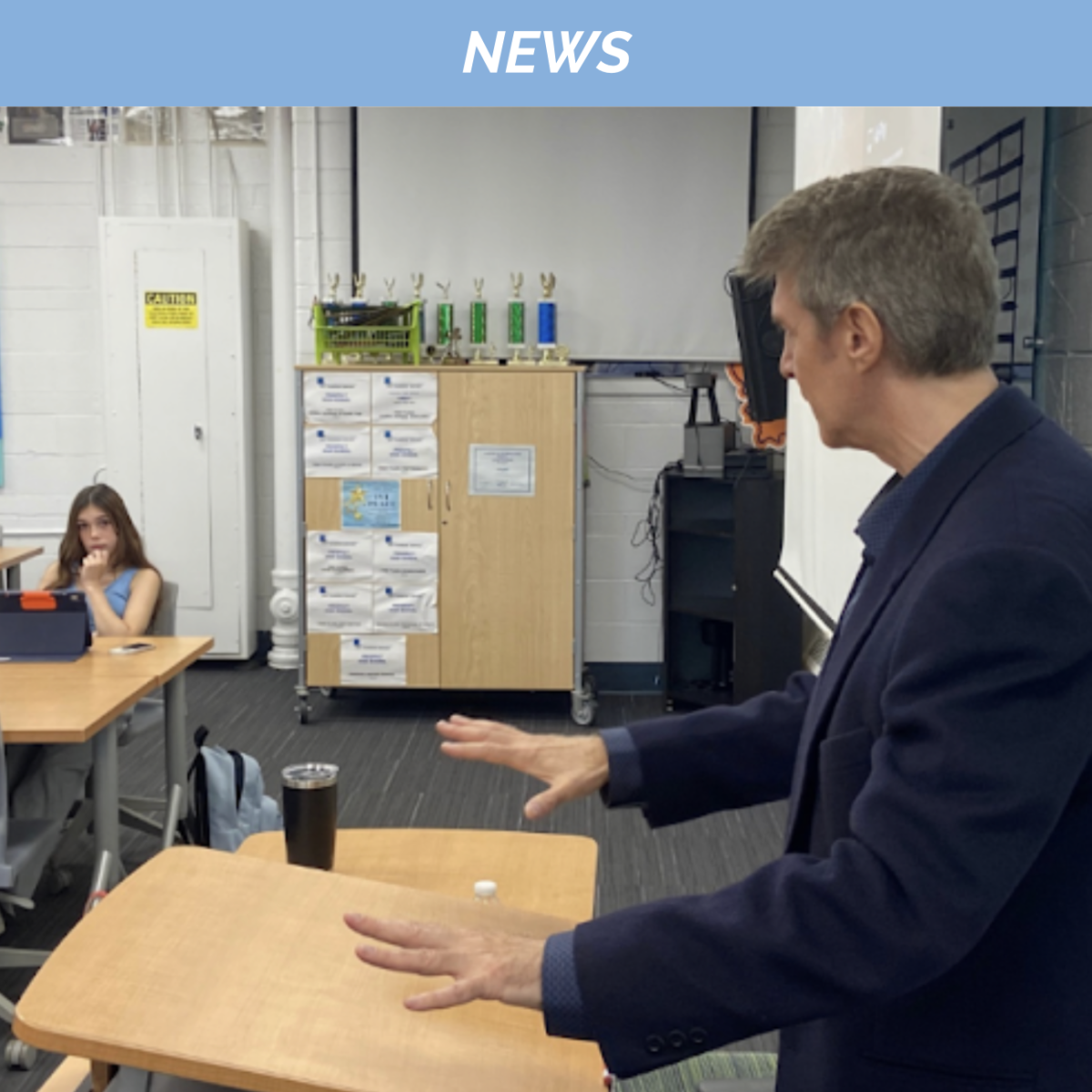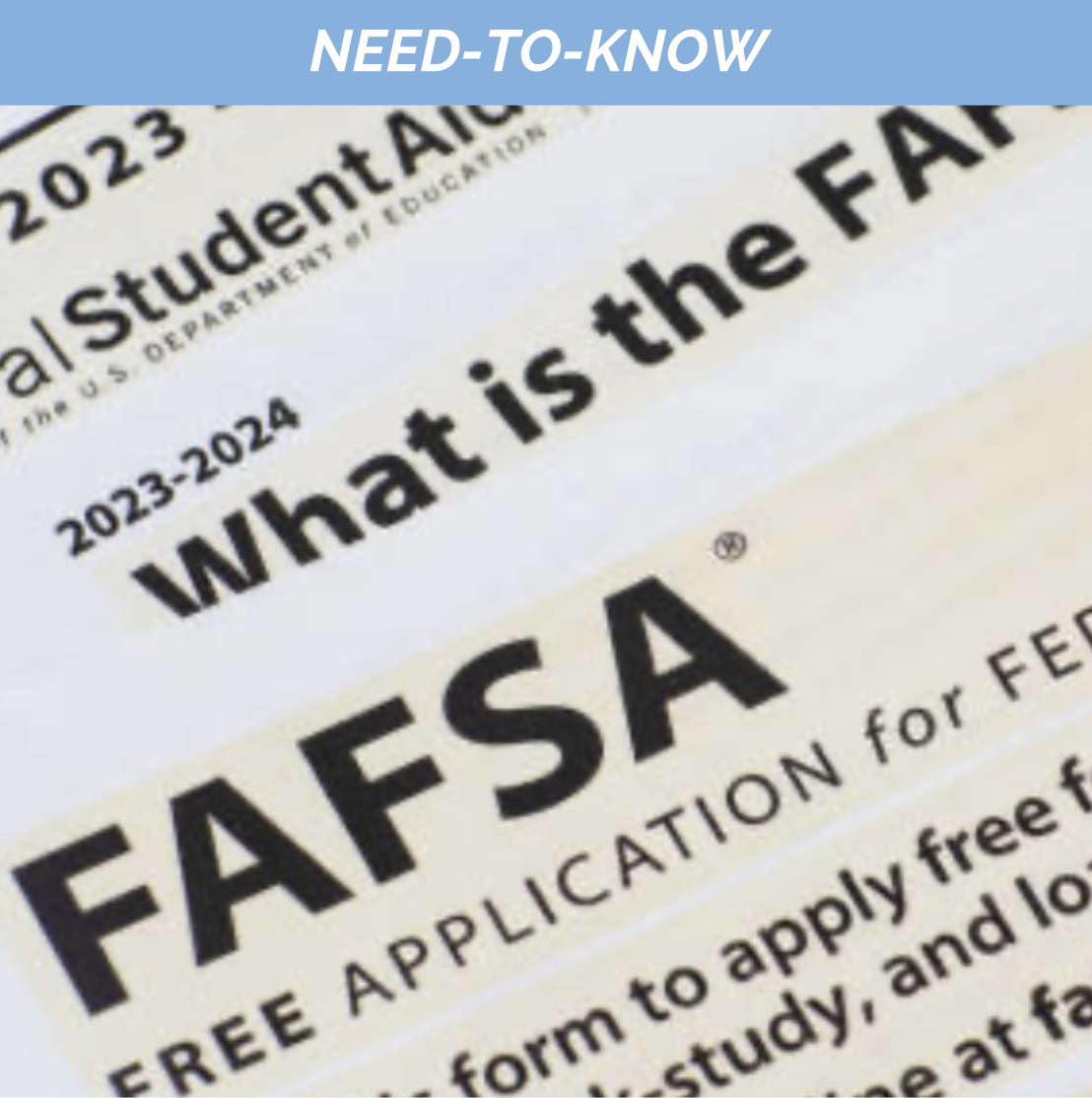Kulieke Theater. This title has been drilled into the theater’s stone wall for years. According to the 1973 Arlington Heights Daily Herald, it’s been the theater name for even longer — ever since the District 214 (D214) Board named it in first Prospect principal Alvin Kulieke’s honor after his death.
The Herald ran Kulieke’s obituary in an earlier issue that year. They described his extensive academic acumen – “a B.A. degree from the University of Chicago and a M. Ed. degree from Northwestern University” – and 31 years in the field of education. They paid respects to his surviving family members and gave a date and time for his funeral. In these respects, it seemed business as usual.
That is, until the reader reaches the fifth paragraph, the first and second sentences and six seemingly innocuous words.
“Mr. Kulieke had been the principal of Prospect High School in Mount Prospect since 1957. A veteran of World War II,” the obituary states, “he was president of [the] Urantia Brotherhood.”
That final clause, no matter how inoffensive it might appear, may contribute to changing Kulieke’s legacy 52 years later. It’s one of many pieces of evidence that could lead to the renaming of Kulieke Theater — and have already sparked efforts to rework the process of naming and perhaps rename facilities themselves across D214.
But what is so controversial about this small line of text? What, exactly, is the Urantia Brotherhood? It’s the name of a school within the Urantia Movement, a fringe “New Age” religious group about which Joseph “Lenny” Flatley knows more than most.
Flatley, a Pittsburgh-based author, journalist and podcaster, investigated a Urantia Movement adjacent-cult for years and published a book, “New Age Grifter: The True Story of Gabriel of Urantia and his Cosmic Family,” in 2021. Flatley’s Neocities website describes how he used “legal documents, press accounts, academic research, and untold hours of exclusive interviews to get to the corrupted core of this experimental society.”
Flatley believes the Movement’s past is very much steeped in eugenicist doctrine. The National Human Genome Research Institute defines eugenics as “the scientifically inaccurate theory that humans can be improved through selective breeding of populations.”
“The Urantia Book contains explicit connections to eugenics, including discussions about ‘biologic disfellowshipping’ of ‘unfit’ and ‘antisocial stocks’ and warnings about the ‘folly of allowing the superior freely to procreate with the inferior,’” Flatley said in a May 2 interview with the Prospector. “These ideas likely reflect the influence of early 20th-century eugenics movements and [the founder] Dr. Sadler’s own views on racial hierarchy.”
He said the Movement isn’t “conventionally dangerous, but its teachings include problematic hierarchical racial classifications and eugenic ideas that could promote harmful stereotypes. The book uses terms like ‘inferior simian tribes’ and discusses the ‘deterioration’ of ‘superior stock’ through racial mixing. These outdated concepts do have the potential to reinforce racial prejudice.”
Flatley maintains that modern Urantia Movement followers are not necessarily as eugenics-supporting as they were in the past.
“Very few of the Urantia [Book] readers I have spoken with believe that stuff about the races are to be taken literally,” Flatley said. “Like many [followers of] dense, large religious books, believers seem to pick and choose what aspects they want to believe and what they don’t believe.”
While Urantia Movement followers today may be more distant from the movement’s origins, Flatley contends its founder Dr. William S. Sadler, however, is a different story.
“He [Sadler] believed in eugenics and racial inferiority,” Flatley said, “and I’m pretty sure Sadler authored most of the [Urantia Book] himself.”
The eugenicism of the Urantia Book — and how Kulieke was involved
Sadler wrote multiple books supporting eugenics, such as “Race Decadence; An Examination of the Causes of Racial Degeneracy in the United States” and “Long Heads and Round Heads; Or, What’s the Matter With Germany.” His personal writings include, among other things, the beliefs that intellectually disabled children should be sterilized nationwide and that interracial marriage is “to be deplored” because it is “biologic fact” that Black people (“the Negro [race]”) are inferior to white people.
The Book, “revealed to” Sadler sometime between 1924 and 1955, contains many racist, ableist and overall eugenicist doctrines Flatley says are inspired by Sadler’s own beliefs. These doctrines are especially present in the sections about a blue-eyed and fair-skinned alien couple who must breed out “inferior stocks” on every planet and African slavery being justified because Africans are “the great slave race.”
Some may say that Kulieke, despite the fact that he was a consistent part of the Movement while Sadler was still alive and leading it, was like those modern Urantia Movement followers who don’t by definition believe the eugenicist doctrine.
But Kulieke wasn’t just a follower. He was a leader.
And it can be argued he wasn’t just a leader, either. He was Sadler’s close, personal friend.
Kulieke and Sadler wrote multiple books together: Urantia Book workbooks simplifying and explaining the original. These include “The Urantia Book Workbooks — Volume II: Science,” which contains both the aforementioned passage justifying African slavery and one advocating for the “veritable slavery” of “subnormal men,” claiming they should be “kept under society’s control.” These workbooks were presumably intended to annotate and paraphrase the 2,097-page original text, yet these quotes were preserved — a move some may argue signifies the two authors considered them important.
According to Movement timeline Urantiapedia, the two of them, with Kulieke’s brother Warren, also co-founded the Chicago-based Urantia Brotherhood School, a seminary for Urantia Movement teachings. The Movement archive devoted to Kulieke contains several science exams he wrote for this school, including questions asking students to fill in which Urantian race was “most intelligent,” which was “most belligerent” and which was “most attractive to Adamites.” Kulieke was elected president of the school in 1967. The archive shows that some of these exams are signed with his name.
He was also pictured at multiple “Forum picnics,” the Forum being a select gathering of Urantia Movement believers, in one photo appearing next to Sadler’s son. Sadler even included Kulieke as one of two executors of his will. The other was Emma L. Christensen — Sadler’s adopted daughter.
Given the information, administration acts
This information reached Prospect’s administration after a KnightMedia-led February investigation unearthed Kulieke’s past with the Urantia Movement. KnightMedia believed the evidence they gathered was enough to write an editorial presenting their discoveries and arguing that knowing what they knew now, Prospect should change the name of Kulieke Theater. But after they explained their findings to administrators to give context in requests for interviews, the school started the process of investigating a name change on its own, negating the need to advocate for one.
“We anticipate the Board of Education will review a recommendation [regarding Kulieke Theater’s name] from the Superintendent this summer,” D214 Community Engagement and Outreach Director Patrick Mogge said in an email to KnightMedia. “While the topic may be discussed in future meetings, any formal decision would take place in open session, consistent with the Open Meetings Act.”
Once informed about Kulieke, Prospect and D214 began an investigation into not just him, but namesakes of facilities across the District. “The district is in the process of finalizing an administrative procedure to guide future considerations regarding the naming or renaming of facilities. The procedure will establish a consistent and transparent framework, ensuring decisions align with district values and community expectations,” Mogge said in the same email to KnightMedia. “This situation [the KnightMedia Kulieke investigation] has highlighted the importance of reviewing our processes, which will help the district thoughtfully navigate any future naming discussions.”
To conduct their research, the district enlisted the help of David Beery, former Political Editor of the Daily Herald and Director of Communications for Maine Township High School District 207 and current part-time writer with D214. Mogge describes how Beery is carrying out “a detailed historical review,” combing through archived Board minutes and old newspapers to primarily focus on why individuals received the honor of having facilities named after them in the first place. Beery is also compiling biographical information to look into these namesakes’ backgrounds.
“Once this research is complete in the coming weeks, the district administration will review the findings to determine next steps,” Mogge said in an April 21 email. “Any new information that emerges after this process will be handled in accordance with the updated administrative procedures.”
Student minority group members call for change
Though Kulieke Theater’s name is nominally metal letters on the side of a wall, real Prospect students are invested in the outcome of the superintendent’s recommendation — especially those a part of minority groups Kulieke may have wanted excluded from the gene pool.
VeryWell Mind describes neurodivergence as “when someone’s brain processes, learns, and/or behaves differently than what is considered ‘typical.’” There is debate over whether all neurodiversities are disabilities. But many common conditions are, such as autism, ADHD, dyslexia and Tourette’s syndrome. And due to the Urantia Book’s eugenics doctrine being explicitly anti-disabled, Prospect’s neurodivergent students are particularly invested in the name change — and the neurodivergent theater-involved students even more so.
“I would love it if the name got changed,” said neurodivergent sophomore Piper Stukenberg, who has participated in theater both on the stage and behind the curtain. “Because we can’t keep honoring somebody whose name alone actively puts other people down.”
Senior Jude Ayala, who is also neurodivergent, agreed, saying, “Why are we paying respect to a man who [was] actively disrespecting my entire person?”

Quanin Brooks concurred that as a Black student, it would be especially meaningful for him if administration changes the name.
“For most people [changing] it would be like, ‘Oh, they changed the name? Whatever,’” he said. “But for me, now that I know [about Kulieke’s past], and the school’s actively taking measures to change [the name] because of how messed up it is — it means a lot to me as a person of color, especially since [we’re] a much smaller minority in the school.” According to the Illinois Report Card in 2024, 1.9% of Prospect’s student population is Black.
Brooks has been an active member of Prospect theater since freshman year, having earned a lead part in the recent musical “Disaster!” and being a part of 12 D214 productions as of this summer.
“[The results of the investigation are] definitely really concerning,” Brooks said. “It’s stuff that didn’t affect me before I didn’t know the background, but it’s more kind of disgusting to hear about. To learn about. And I understand why the school feels the way they do, because I agree, it’s horrid.

“Prospect’s theater isn’t just what the title is,” said Brooks. “It’s so much more than that. It’s known to be much more than that.”
Flatley maintains that Urantia Movement members are a complex group who cannot be boiled down into a monolith.
“People join the Urantia Movement for various reasons,” he told the Prospector. “Some are drawn to its attempt to harmonize science, religion, and philosophy into a comprehensive understanding of God and the universe. Others appreciate its detailed cosmology and spiritual framework. Even among adherents, there are ongoing discussions about reconciling the book’s teachings on race and eugenics with contemporary values and understandings of human equality.”
When asked whether he believed the district should change the name of Kulieke Theater, he responded, “I really don’t know. That’s for your community to decide!”
Neurodivergent junior Murphy Barber, for one, has a straightforward solution. “Just call it Prospect Theater,” he said. “Call it literally anything else.”
Watch this video podcast for a conversation with the student reporter who originated this story.



















Halbert Katzen • Jul 8, 2025 at 10:26 am
The word “hybridization” appears in four paragraphs of The Urantia Book. What is up with the gross mischaracterization of the book’s teachings? Why disparage people progressive enough to promote teachings that were advanced for the period and themselves, even, and that are consistent by today’s standards?
(82:6.5) Hybridization of superior and dissimilar stocks is the secret of the creation of new and more vigorous strains. And this is true of plants, animals, and the human species. Hybridization augments vigor and increases fertility. Race mixtures of the average or superior strata of various peoples greatly increase *creative* potential, as is shown in the present population of the United States of North America. When such matings take place between the lower or inferior strata, creativity is diminished, as is shown by the present-day peoples of southern India. [“Present” should be considered 1935.]
(82:6.6) Race blending greatly contributes to the sudden appearance of *new* characteristics, and if such hybridization is the union of *superior* strains, then these new characteristics will also be superior traits.
(82:6.7) As long as present-day races are so overloaded with inferior and degenerate strains, race intermingling on a large scale would be most detrimental, but most of the objections to such experiments rest on social and cultural prejudices rather than on biological considerations. Even among inferior stocks, hybrids often are an improvement on their ancestors. Hybridization makes for species improvement because of the role of the *dominant* genes. Racial intermixture increases the likelihood of a larger number of the desirable *dominants* being present in the hybrid.
(82:6.8) For the past hundred years more racial hybridization has been taking place on Urantia [Earth] than has occurred in thousands of years. The danger of gross disharmonies as a result of crossbreeding of human stocks has been greatly exaggerated. The chief troubles of “half-breeds” are due to social prejudices. [Emphasis is in the original.]
The text respects the inherent value of all races, condemns prejudice, applies common sense, encourages wisdom, and is consistent with science.
Rebecca Bynum • Jun 11, 2025 at 6:31 am
Urantia Book Readers Call on Prospect High School to Retain Kulieke Name
June 11, 2025
(NASHVILLE, TN.) A campaign has been launched to remove the name of the former President of the Urantia Brotherhood, Alvin Kulieke, from the Kulieke Theater at Prospect High School in Mount Prospect, Illinois, where he served as the school’s very well-respected first principal. The campaign was launched by a 16-year-old student reporter, Abigail Gilliland, for the school newspaper, The Prospector.
Miss Gilliand was first prompted to condemn the late Mr. Kulieke, due to her discovery of a minstrel show having been performed at the school during his tenure in the 1950s. This is a perfect illustration of the failure of modern education to prepare students to enter imaginatively into the sensibilities and worldviews of the past, even the recent past. Because however peculiar minstrel shows seem to our modern sensibility, they remained a popular form of entertainment for close to one hundred years. We also find it odd that a modern form of entertainment which glorifies criminality, violence, and misogyny (hip-hop music) is deemed perfectly acceptable, but Al Jolson singing “Mammy”- quelle horreur! One can only imagine how appalling the upright teachers and principals of yesteryear would find our modern entertainment.
The second indictment Ms. Gilliland levels against Mr. Kulieke is his early involvement with the Urantia Book, and despite the fact that the Urantia Book is headquartered in nearby Chicago, Miss Gilliand used a biographer of a cult leader in Arizona, who uses Urantia book terms and concepts but is not in any way affiliated with the movement proper, as her “expert source.” Here again is a failure of her teachers to instruct her to simply call or visit the Urantia Foundation itself as this should have been her primary source.
As part of its revelation to our world, the Uranta book carries a detailed narration of our distant past so that we may better understand where we came from and where we are going. According to the book, life does not arise spontaneously but is designed and implanted. Evolution likewise occurs by design specifically in order to create beings who are capable of knowing God and developing immortal souls. In this view, the physical body is nothing more than the substrate in which the potentially immortal soul is born and develops.
This is not to say that genetics are unimportant and according to the book, this is especially true with regard to the development and maintenance of civilization. Had Miss Gilliand actually read the book, she would have discovered that it advocates racial mixing: “Hybridization of superior and dissimilar stocks is the secret of the creation of new and more vigorous strains. And this is true of plants, animals, and the human species.”
Furthermore, the relatively mild form of eugenics advocated by the Urantia Book is nothing compared with the industrial scale elimination of the unborn occurring by way of official policy in the United States today. Over 63 million abortions have been performed since 1973 and this has certainly affected the gene pool to a far greater degree than anything advocated in the Urantia book, which was written in the early years of the last century, decades before “the pill” came into being or abortion became widespread. Francis Galton, who coined the term “eugenics” in 1904, was only advocating polices to encourage young people to marry earlier and have more children, while at the same time discouraging the reproduction of the most anti-social, parasitic criminals, which, if they are incarcerated, are unlikely to reproduce in any case.
“Today the word ‘eugenics’ is often used as a scare tactic due to its use to describe the peculiar experiments performed in Nazi Germany,” said Urantia Corps for Spiritual Progress founder Rebecca Bynum, “but this does not discount the solid genetic research which is now being done. In vitro fertilization, gene therapy, and CRISPR gene editing are just the beginning of a revolution in modern genetics which will enhance the health and vitality of future generations. The knee-jerk condemnation of this research is unnecessary and unwise.
“Yes, the Urantia book uses terms such as ‘better and worse,’ ‘higher and lower,’ ‘superior and inferior,’ which have all but been eliminated from academic discourse when it comes to human beings and culture; however, the average person using common sense knows those terms still apply,” she said.
In conclusion, the Urantia Corps for Spiritual Progress strongly objects to the removal of Alvin Kulieke’s name from the Kulieke Theater at Prospect High School. The hysteria employed by Miss Gilliand implying that Mr. Kulieke advocated for the elimination of the “neurodivergent” is absurd and defamatory and we call on the school administration to reconsider this hasty move based on the inadequate research of a 16-year-old student.
James Watkins • Jun 2, 2025 at 11:13 am
First of all, it might be helpful to actually read the Urantia Book,instead of getting negative, uninformed secondhand opinions, but such is the way of the lazy intellectual.
After 42 years of study, I can assure the reader the Urantia Book is not represented by any fringe group that seeks to exploit its wonderful message of unity for all people under One God. But in today’s world, these same people will distort truth and bend science to their own nefarious needs.
Forgive them Father, for they know NOT what they do.
Alvin, by the way, probably doesn’t give a damn. The school should be lucky to have had such a person head its reigns, and equally embarrassed to be so easily misguided by secular propagandist who think removing a name makes things “safe” for the weak-minded.